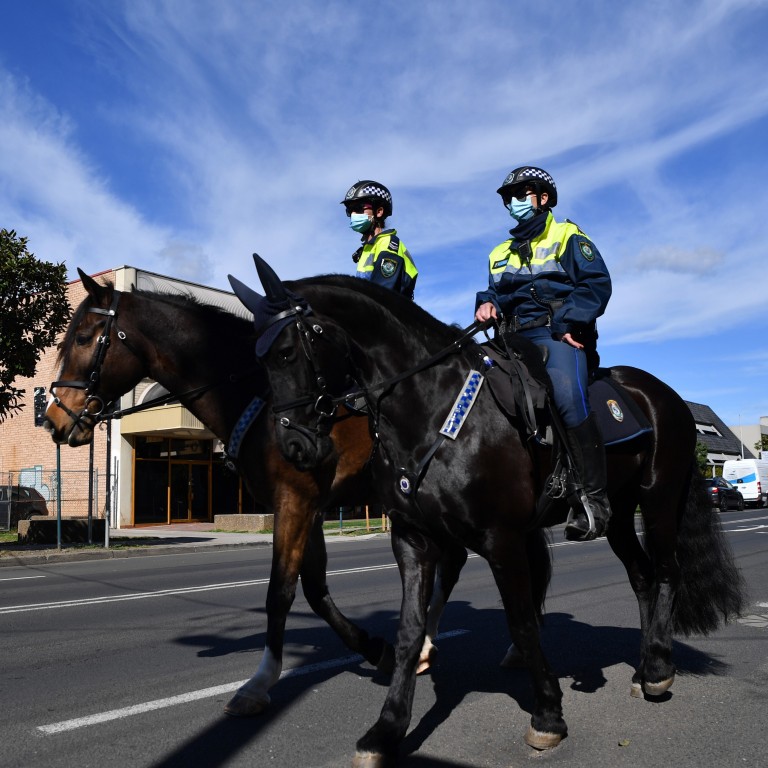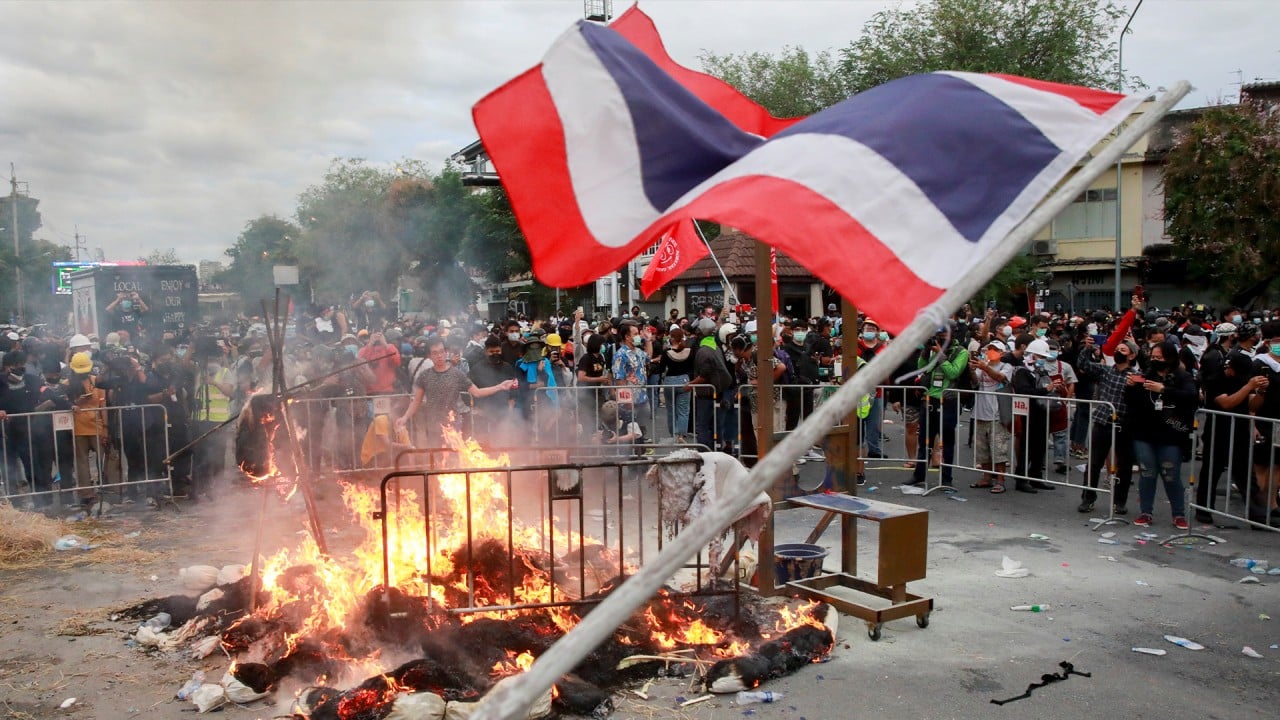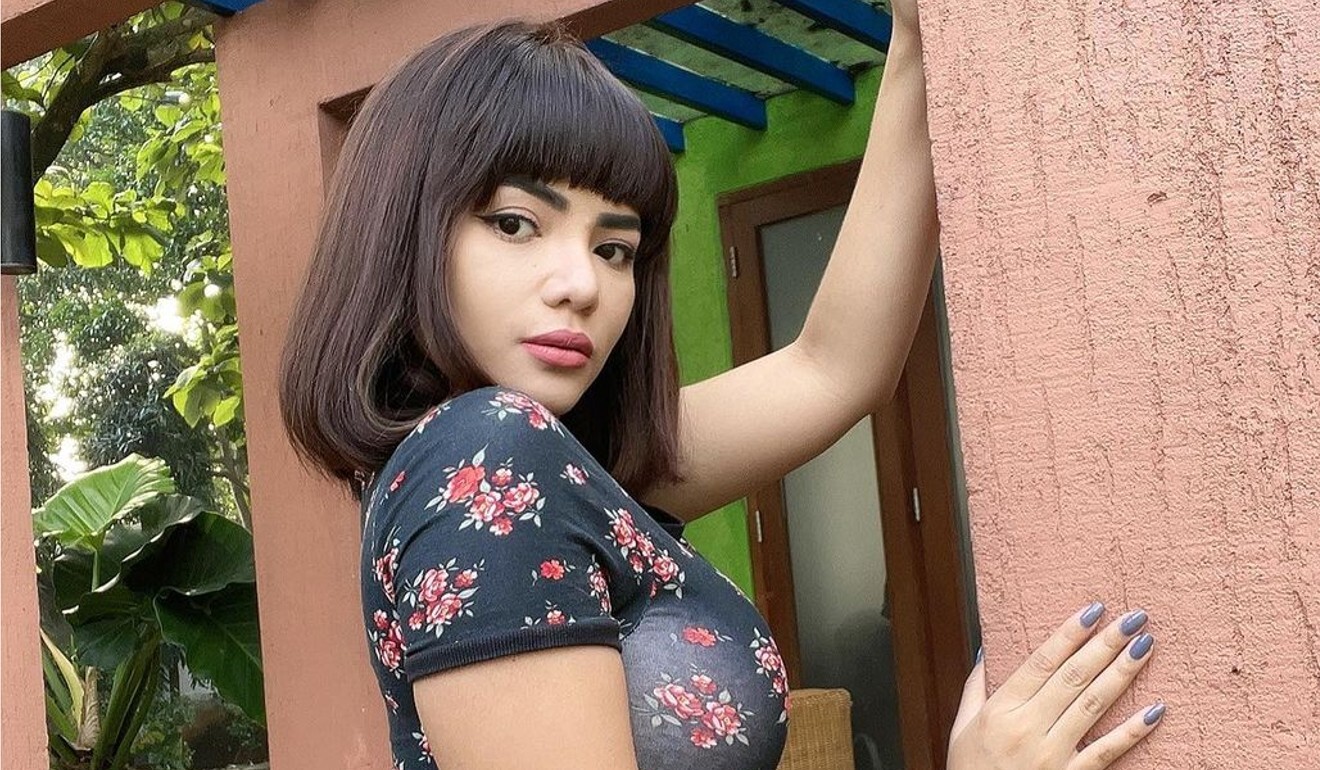
Coronavirus: Sydney struggles to stem Delta variant surge; chaos at Philippine vaccination sites over false news
- Australia’s largest city logged record 291 infections on Friday despite being in a weeks-long shutdown
- In the Philippines, false news spread on social media that unjabbed residents would be deprived of cash aid during the lockdown
“Just based on the trend in the last few days and where things are going, I am expecting higher case numbers in the next few days and I just want everyone to be prepared for that,” New South Wales Premier Gladys Berejiklian told reporters in Sydney.
New South Wales reported 291 locally acquired cases of Covid-19 on Friday, most of them in Sydney, exceeding the previous daily high of 262 hit a day earlier. The state also registered one new death, raising the total to 22 in the latest outbreak, all in Sydney.
Of particular concern is the growing number of people positive with the highly infectious Delta strain moving around in the community, particularly in Sydney’s southwestern suburbs. Around one-fifth of Friday’s cases have spent time outside while infectious.
More than 60 per cent of Australia’s 25 million citizens are in hard lockdowns on Friday to try to contain latest surge, including the country’s three largest cities Sydney, Melbourne and Brisbane.
Study on vaccines’ effect on Delta raises hopes for shorter isolation periods
The fast-moving Delta strain is testing Australia’s largely successful handling of the coronavirus crisis that has kept its exposure relatively low with just over 35,600 cases and 933 deaths.
But stop-and-start lockdowns amid a sluggish vaccination roll-out, with only about 21 per cent of people above 16 fully vaccinated, have frustrated residents.
Prime Minister Scott Morrison, under fire for the slow roll-out, has blamed the delay on changing medical advice on locally produced AstraZeneca’s vaccines over concerns of rare blood clots and supply constraints over Pfizer shots.
Victoria, next to New South Wales and home to nearly 7 million people, on Thursday entered its sixth lockdown since the pandemic began, just weeks after exiting its last, jolting residents and triggering an anti-lockdown rally in state capital Melbourne.
It reported six locally acquired Covid-19 cases on Friday, a day after several unlinked new infections in Melbourne suddenly emerged, down from eight a day earlier.
Of Friday’s cases, all are linked to previously reported ones but were not in quarantine during their infectious period, the state’s health department said.
In Brisbane, the state capital of Queensland, the authorities reported 10 new cases, down from 16 the day before, and added that they were hopeful a lockdown would be lifted as planned on Sunday since all but two cases were isolated before testing positive.

07:07
The global spread of the highly contagious Delta variant of Covid-19
Japan’s total infections hit 1 million
Japan reached the milestone of 1 million coronavirus cases on Friday, domestic media reported, as infections soared in Olympic host Tokyo and other urban areas as the country struggled to contain the Delta variant.
New cases in Tokyo hit 4,515, the secondhighest after Thursday’s record 5,042, while the neighbouring, populous prefecture of Kanagawa saw its cases soaring to more than 2,000, quadrupling in less than two weeks.
Infections in Osaka, the biggest city in the country’s west, also rose to a record-breaking 1,310, in a sign the pathogen is quickly spreading outside Tokyo.
The total number of cases since the pandemic began last year is now above one million, tarnishing the country’s early success in containing the disease.
While the contagion appears to quickly spread from the capital to other regions, Prime Minister Yoshihide Suga struck a cautious tone on expanding a state of emergency to the entire country.
“We need to take into account local conditions. Each region can take their own step,” Suga told reporters in Hiroshima, where he attended a ceremony to commemorate the 76th anniversary of the atomic bombing.
Still, the worsening health crisis is likely to put pressure on Suga ahead of an election that must be held by October.
Suga also said any decision on whether to allow spectators in the Paralympics, scheduled on August 24-September 5, will be made after the end of the Olympics on August 8.
Suga reiterated that he did not think holding the Games contributed to rising infections.
Vietnam extends curbs in Hanoi
Vietnam’s capital Hanoi will extend coronavirus restrictions until August 22, its health ministry said on Friday, after authorities warned of new clusters of infections detected in the city of more than 8 million people.
Hanoi has in the past two weeks ordered people to stay at home and halted all non-essential activities, but a thre-fold rise in infections has prompted the city to extend the current curbs, due to end on Saturday.
The city reported 116 new cases on Friday and has recorded 2,184 cases since the pandemic began, official data showed.
While the numbers are still low, authorities are wary after the highly contagious Delta variant of the virus has helped drive up infections across the country to over 193,000 cases.
“The risk is still high with the continuous detections of new clusters of infections, many of which have unidentified sources,” the ministry said following Hanoi’s announcement of the extended restrictions.
Nationwide, about a third of Vietnam’s 63 cities and provinces are under strict coronavirus curbs as the country struggles to get on top of its worst outbreak so far.
The ministry reported 8,324 new infections on Friday, up from 7,244 cases on Thursday. It reported 296 additional coronavirus deaths on the same day, raising the country’s death toll to 3,016.
Just 820,000 people have been fully vaccinated in Vietnam, or less than 1 per cent of the country’s 98 million population, according to official data.
Filipinos flood vaccination sites over false news
Officials placed Metropolitan Manila backed under lockdown until August 20, as a new spike in Covid-19 infections that health officials say could be due to the highly contagious Delta variant threatens to overwhelm hospitals. Three other regions, including nearby Laguna province, were also placed under lockdown until August 15.
Only authorised workers for essential businesses and residents on medical emergencies or food-buying errands can venture out. An eight-hour curfew was imposed in the capital region starting at 8pm and police checkpoints were set up in city boundaries.
A day before the lockdown, false news spread on social media that unvaccinated residents would either be prohibited from leaving their homes to go to work or deprived of 1,000 pesos (US$20) aid. It sent large crowds heading for vaccination centres in the cities of Manila, Las Pinas and Antipolo even without prior registrations.

Thousands lined up for several blocks in designated government centres and shopping malls to get the jabs, at times sparking arguments and complaints and snarling traffic.
In Manila alone, up to 22,000 people showed up outside vaccination centres before dawn. People descended in groups and arrived in vans from nearby provinces, some “rowdily removing barricades,” city officials said, citing police reports. Many were not registered under Manila’s immunisation programme.
Police were forced to stop vaccinations in at least one of the shopping malls and asked the crowds to return home.
Is fractional vaccine dosing a solution for supply-short Southeast Asia?
“We cannot allow our national immunisation programme to become superspreader events, especially given the threat posed by the Delta variant,” the Department of Health said in a statement following the chaotic scenes.
Officials later stressed that even unvaccinated residents could venture out in case of medical emergency. They can also obtain village permission to buy food, medicine or other essential items. They cautioned the public not to fall for fake news on social media and urged them to follow official government announcements.
The government’s vaccination campaign, which started in March after repeated delays, has faced vaccine shortages, delivery delays and hesitancy, including from those who prefer Western brands.
More than 10.2 million Filipinos have been fully vaccinated and 12.2 million others have received their first shots. About 70 million people are targeted to be immunised this year, said Carlito Galvez Jnr, who oversees the programme.
The Philippines reported more than 8,100 infections on Thursday, with 196 deaths, bringing the total number of cases nationwide to more than 1.6 million with 28,427 deaths in one of Southeast Asia’s worst outbreaks.

03:07
Thailand sees overwhelmed hospital morgues and renewed protests amid biggest Covid-19 outbreak
Thailand logs record cases
The new figures brought total infections to 714,684 and total fatalities to 5,854 since the pandemic began last year.
The government has imposed severe curbs on daily life in dozens of provinces, including Bangkok, as it battles to contain the outbreak, fuelled by the highly contagious Delta variant of the virus.
Bars, swimming pools, museums and other public venues have been closed, strict limits placed on shopping malls and restaurants and a seven-hour night-time curfew imposed.
After a sluggish start beset by procurement problems, authorities are trying to speed up the vaccination programme, and more than 14 million people have now had at least one shot.
Government spokesman Anucha Burapachaisri said the administration aimed to roll-out at least 10 million doses a month by the end of the year.
South Korea to compensate nurse paralysed after jab
The nursing assistant, who has not been identified, received AstraZeneca’s shot on March 12 and later suffered from double vision and paralysis and was diagnosed with acute encephalomyelitis, the state-run Korea Workers’ Compensation & Welfare Service said on Friday.
The service said in a statement the woman did not have underlying conditions and there seemed to be a “a reasonable causal link between the side effects and the vaccination”.
AstraZeneca, asked about the case, did not refer to it directly but said patient safety was of the utmost importance for it and regulators around the world.
“International regulators, including the World Health Organization, continue to reaffirm that the vaccine offers a high-level of protection against all severities of Covid-19 and variants of concern, and is a key part of global efforts to overcome the virus,” AstraZeneca said in a statement.
Why are coronavirus vaccines viewed so negatively?
The Korea Disease Control and Prevention Agency (KDCA) had determined that with the available evidence, it could not verify a connection between the woman’s case and the vaccine but it was open to re-evaluation when more evidence was available, said agency official Choi Seung-ho.
South Korea, like many other countries, has indemnified major vaccine makers against claims and set up funds to cover any costs.
Health care workers were among the first to be eligible for the vaccines in South Korea and were encouraged by employers to be vaccinated but they were not forced to.
The compensation service concluded that the woman was eligible for government compensation and benefits under the Industrial Accident Compensation Insurance Act because her medical situation was related to her work.
She will be compensated for missed work hours and benefits will cover her medical expenses and disabilities, the service spokesman said. There were six more cases pending a decision, the spokesman said.
The KDCA said a total of 1,562 cases, including 14 deaths, had been reviewed for compensation regarding damages from Covid-19 vaccination, of which 983 had been compensated. There has been no compensation for a case involving a death.
Singapore eases Taiwan travel rules
Short-term visitors who spent at least the last 21 days in Taiwan can apply for an Air Travel Pass with immediate effect to enter Singapore on or after August 12, the statement said.
Indonesian DJ faces porn charges over bikini protest
Dinar Candy was seen in footage widely shared on social media standing by the side of a Jakarta road holding a sign which said she was stressed by Indonesia’s extension of movement restrictions to curb the spread of the coronavirus.
“Her actions did not heed cultural and religious norms,” Azis Andriansyah, police chief for the Indonesian capital’s southern districts, said in comments aired by the Kompas TV broadcaster on Thursday. She had not been detained, Azis added.

South Jakarta police and Dinar Candy did not respond to requests for comment. Dinar Candy’s lawyer, Acong Latief, said her actions may have been motivated by stress.
Muslim majority Indonesia has in recent years seen a rise in conservatism, with religious groups demanding a larger role for Islam in politics and society. Its controversial pornography law carries a maximum punishment of 10 years imprisonment or a 5 billion rupiah (US$350,000) fine.
Indonesia has since July been battling a devastating second wave of Covid-19 infections driven by the highly contagious Delta variant of the virus. This week, President Joko Widodo extended social distancing measures until August 9.
The Southeast Asian country passed a grim milestone of over 100,000 deaths on Wednesday.
Reporting by Reuters, Bloomberg, Associated Press
